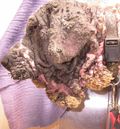One of our readers writes:
I have 2 Chihuahuas, one weighs 10 pounds and the other weighs 15 pounds. They both have the same symptoms: scratching, biting and pulling out hair. My vet gave them both a long-acting cortisone injection June 1st, and the symptoms stopped. On July 2 they started again. I waited until July 11 and took them back for another dose. The reielf only lasted about 1 week this time. I don't want them to have to take the shot every month. What is the alternative to Depo? We have looked and found no fleas, mites etc, just allergies. Thank you!
My answer:
I always feel that the best person to advise you is the veterinarian who is seeing your dog. I can only give some general information.
It is very important to rule out other causes of itching, such as the mites and fleas that you mentioned. One also considers skin infections with bacteria or yeast. If infestations or infections are present, they may actually be causing the bulk of the itching. Taking care of those factors can really reduce the need for specific allergy treatment (or make it more effective).
 This dog has allergies… and mange mites, and yeast infections, and staph bacterial infections, and a congenital skin disorder. This is the most bizarre case ever, but the point is that you have to look at ALL the problems, not just the allergy.
This dog has allergies… and mange mites, and yeast infections, and staph bacterial infections, and a congenital skin disorder. This is the most bizarre case ever, but the point is that you have to look at ALL the problems, not just the allergy.It is possible to give oral forms of cortisone. Some dogs (20% or less) respond to antihistamines. Many dogs benefit from bathing to decontaminate the skin regularly (once or twice weekly). Dogs with itching skin have allergens (pollen, dust, etc.) on their skin, and working its way down through defective skin barriers to trigger the allergy. There are new products that help restore the skin's natural barriers, like Allerderm, or Douxo. Oral fish oil helps some dogs.
With such a rapid recurrence of the itching, especially after the second shot of long-acting cortisone, I would be concerned about a number of possibilities. Your veterinarian has probably already discussed these with you.
If there is a constant, heavy exposure of what you're allergic to, then the medicine doesn't work as well. A common example of this would be a flea-allergic dog who was covered with fleas.
Another example is the food-allergic dog. Food allergies are unlikely to be something new in the diet. The specialists tell us that it generally takes months for the dog to become sensitized to a food substance. Therefore, it is something he has been eating for some time.
Medicines rarely help the food-allergic dog. Again, they have such a constant intimate contact with the allergen — they are EATING IT. It's inside them from one end to the other. It is necessary to do a dietary elimination trial. The dog is fed NOTHING but a hypo-allergenic diet for four to 12 weeks. This might be a novel ingredient diet (like kangaroo and oats, or rabbit and green pea), or it might be a hydrolyzed antigen diet (like Purina HA or Hill's Z/D), where the protein is broken down into smaller chunks of amino acids.
This has to be done for a long time to allow every bit of the old diet to leave the intestinal tract. Most food-allergic patients will show some improvement by four weeks, but may take much longer to get itch-free (12 to 16 weeks).
Most allergic dogs have multiple things they are allergic to. After the dietary elimination trial, if they are still itching, one could look at allergy testing. I wouldn't go to that expense first, though. The testing doesn't help tell you about food allergy. That takes the dietary elimination trial.
Most itchy dogs can find relief, but many take continuing management, rather than being "cured".


I have 10 year old golden chow named Lucy. We live in Montreal so it gets cold in the winter. Lucy has many allergies including all heating systems. For her general allergies we have had a customized vaccine made which must be administered every 2 weeks. In the winter this must be supplemented with Atopica. It is a bit costly but Lucy is a fantastic companion.
Thanks for sharing your experience. I should have mentioned Atopica. We think it is a great drug, but use it in only a few patients, due to the expense.
The allergy hyposensitization vaccine is a really good tool, but we do like to rule out food allergies before going to the expense and trouble of using it.
Thanks for reading and writing.
Poor dog … My question is if you’ve tried everything that’s mentioned here and nothing works for your dog, do you just give up or continue to research more natural methods as well as traditional dog medication? Also, could your house or some other items within the environment be why the dogs symptoms continue to stay? Good luck …
Hello I’ve tried so hard to email you however they just keep coming back to me this is my problem my 9 year old Dalmatian who has been in perfect health howelled as if he was in the worst pain I came running back to him and he was seizing on his bed he then howelled again and that was it he was gone just like that , it was extremly hard as I am a single mother on the transplant waiting list myself and here my boys Dalmatian passes and we have no answers . Please what could have happened ? His eyes wouldn’t close he always Howells if there’s a fire truck but this time was different he was in severe pain , please help me and my boys lay him to rest .
Hello, Vanessa,
These cases are so frustrating. Sometimes even with a complete post-mortem exam and pathologist’s exam we can’t be sure.
With this starting as a seizure, the top of my list would be some sort of vascular event in the brain. By vascular event, I mean something that affected the blood vessels. We are talking about things like a stroke (stopped up blood vessel in the brain), aneurysm (a weakened blood vessel that swells out like a “bubble” on a tire and breaks), or a brain tumor damaging the circulation.
These are not very common in dogs, as dogs don’t commonly have high blood pressure, and they don’t have cholesterol problems.
You couldn’t really diagnose something like this before it happened, as it would take an MRI. Nobody has an MRI as part of their regular checkup.
I am sorry for your loss. This was nothing that you did or didn’t do.
The allergen could possibly in the food or in the environment. This is very frustrating indeed.. Anyway, thanks for posting this topic which is very informative to anyone..
Dog’s can itch for a number of reasons. It helps to find out what is causing it as quickly as possible. It cuts down on the amount of aggravation that both they and their people go through.
I don’t think any one wants to be struggling with itching as a result of fleas or mites. Over the counter products are pretty effective in keeping this under control and it’s much easier to manage this type of allergen.
Hello, Cassandra,
I don’t find that OTC preparations are particularly helpful with mange mites.
No matter what type of flea control products you select, or where you purchase them, you need to understand the flea life cycle, and use the products within their limitations.
A consultation with the veterinarian should not only establish the diagnosis, but also give you the information to allow you to control your problem, regardless of where you purchase products.
When a client purchases parasite control products from me, they know that I have products that work, that I will help them to use the products effectively, and that if they are having trouble, I will do more than give them their money back. I will work until their problem is solved.
Too often, the pet-owner is extremely frustrated because they do not have enough understanding of the big picture to get the job done. When they go back to Wal-Mart, they can get their money back, but they still have their problem.
People don’t want their money back. They want their problem solved, and that is my job.
I have problems with my dog in the past where my dog have allergy on certain dog food. First i don’t care much on the itchy problem. But, it makes my dogs so sick, until he almost die. Thank God i could manage to save him.
http://www.cepumas.com
How can I get rid of mites effectively?
Hello, Darcy,
If we are speaking of dogs or cats, then I would recommend treatment with one of the isoxazolines, like Bravecto or Credelio. Bedding should be put in a clothes dryer on high dry heat for 30 minutes before washing and drying again. Mites don’t live very long off the host, nor travel very far.